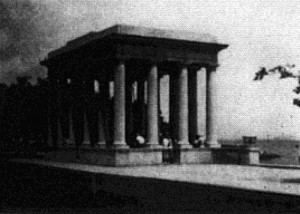
"Dr. Crane has a humorous approach for a visit to Boston, Lexington, Concord, Bunker Hill, Plymouth Rock, and the Mayflower II. Each sequence is preceded by a title quotation from a famous writer, to wit: "Boston.....the hub of the solar system" by Holmes; "The fate of the nation was riding that night" by Longfellow; and ends with "the unconquerable rectitude" of the Plymouth Maiden and Edward Crane" PSA Journal, Oct. 1961, 48-49.
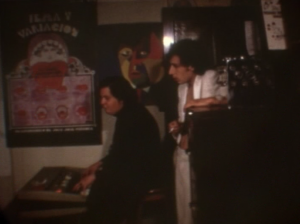
"Quizá para dejar claro que abordaba el tema desde un punto de vista artístico, la película comienza con imágenes de erotismo en las artes plásticas (Picasso y Fiona Alexander, principalmente) para relatar la historia de un hombre (Salvador Garcini) que se acerca sensualmente a su amada (Tina Romero) y descubre que tiene una vagina dentada, cosa que lo desorienta y conflictúa. Es curioso que a diferencia del poema de Neruda en el que se había inspirado, la película no mostraba el ejercicio de una sexualidad plena y consumada, sino precisamente de los miedos a ella.
El joven vaga atormentado por las calles de la ciudad. Acude con una especie de gurú (Juan José Gurrola), que interpreta música neuroatonal en un teclado eléctrico, mientras resuena el poema de Neruda. A partir de esto el joven recupera sus fuerzas y recibe una suerte de inciación sexual con una mujer de vestido blanco en la pirámide de Cuicuilco para finalmente volver, todo complejo superado, a la mujer del principio" (Vázquez Mantecón, 2012)
"Maybe to make it clear that the topic was addressed from an artistic perspective, the film begins with erotic images from plastic arts (mainly Picasso and Fiona Alexander) to tell the story of a man (Salvador Garcini) that approaches sensually his loved one (Tina Romero) and discovers that she has a Vagina Dentata, which disorients and conflicts him. It is curious that unlike the Neruda poem it is inspired by, the film doesn't show a free and consummated sexuality, but the fears associated with it.
The tormented man wanders the streets of the city. He goes to a sort of spiritual guru (Juan José Gurrola), that interprets neuro-atonal music in an electric keyboard, while Neruda's poem sounds in the background. From this point the young man regains his strength and receives a sort of sexual initiation with a woman dressed in white in the pyramid of Cuicuilco to finally come back, all complexes aside, to the woman of the beginning" (Vázquez Mantecón, 2012)
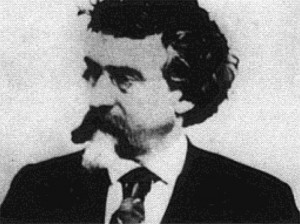
"Mathew Brady, the historian with a camera, photographed everyone of importance including Andrew Jackson, Henry Clay, Edgar Allen Poe, Abraham Lincoln, and many battle scenes of the Civil War. This motion picture is built entirely of photographs by Brady and his cameraman. Mr. Southard has used the zoom lens and lap dissolves to create a feeling of movement, supported by a good sound track" PSA Journal, Oct. 1961, 49.
"doc. didattico"/educational film
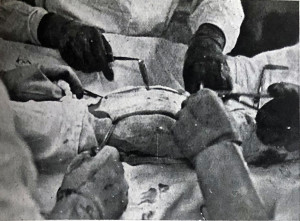
"doc. scientifico"/scientific documentary
"I Guf di Firenze ha prodotto quest’anno due film scientifici. Il soggetto del primo: Medicina e sport è di Franco Pratesi e la Regia di Mario Chiari. II film ripreso, da Fosco Maraini e sonorizzato cla Alessandro Krauss, ha lo scopo di divulgare fra gli sportivi e i medici degli sportivi tutta quella serie di indagini necessarie affinchè ogni individuo che si prepara a svolgere uno sport sia indirizzato verso quell'attività più adatta al suo organismo, si che ogni sport abbia il contributo degli individui più adatti. Dalla massa dei giovani che entrano nei ranghi universitari si inizia la selezione con l'esame medico generale, passando poi all'esame etnico morfologico e quindi all'esame funzionale (esame del polso e del respiro, pressione arteriosa, gettata cardiaca, diagrafia del cuore, elettrocardiografia, capacita vitale, metabolismo basale, debito d'ossigeno, dinamometria, ergografia). Ai lavori Standar per Ie misurazioni sono state sostituite gare sportive di vario carattere, principalmente di gare alle ad individuare particolari requisiti: Canottaggio, sci, disco sul ghiaccio, gare atletiche, mettendo specialmente in raffronto il comportamento in gara di un atleta allenato e di un atleta non allenato. II film è completato da diagrammi animati a illustrazione di particolari indagini (gettata cardiaca, metabolismo basale, ecc.) ed è stato realizzato servendosi delle dotazioni del Laboratorio di Valutazione Fisica e Sportiva del GUF di Firenze, e con la collaborazione delle cliniche Universitarie."
"The Guf of Florence has produced two scientific films this year. The screenplay of the first: Medicine and Sport is by Franco Pratesi and the direction by Mario Chiari. [The other film is Trasfusione di sangue.] The film, shot by Fosco Maraini and with soundtrack by Alessandro Krauss, has the purpose of divulging among sportsmen and sportswomen and the physicians of sportsmen and women that series of investigations necessary so that every individual who prepares to play a sport is directed towards that activity which is most suitable for his or her organism, so that every sport has the participation of the individuals most suited to it. From the mass of young people entering the university ranks, the selection begins with the general medical examination,
then passing to the ethnic morphological examination and then to the functional examination (pulse and breath examination, blood pressure, cardiac output, heart chart, electrocardiography, vital capacity, basal metabolism, oxygen debt, dynamometry, ergography). The work of standard measurements have been substituted by sports competitions of various character, mainly by competitions to identify particular requirements: Rowing, skiing, ice hockey, athletic competitions, especially comparing the competitive behavior of a trained and an untrained athlete.
The film is completed by animated diagrams illustrating particular tests (cardiac output, basal metabolism, etc..) and was made using the equipment of the Laboratory of Physical and Sports Evaluation of the GUF of Florence, and with the collaboration of the University clinics."
—Il Ventuno 47 (Review of the G.U.F. of Venice) July-August 1937
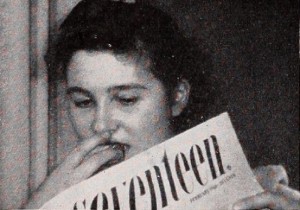
"In Maxine's Big Moment, William Messner proves that he knows the language of the motion picture, for he tells his tale in true visual terms. No subtitles are used, nor are they needed. This is a small film but a suave one, scarcely more than a vignette, as it recounts the excitement of a teen age girl's first formal dance. In it, the producer has used high key lighting that is eminently suitable in portraying a lovely young girl anticipating and preparing for a party. The choice of softcolor backgrounds adds immensely to the mood of the film, and the imaginative mirror shots in which the young lady pins a corsage to her gown are noteworthy. Fine editing and smooth transitions, in addition to good acting, combine to make a delightful and entertaining home movie." Movie Makers, Dec. 1948, 476.
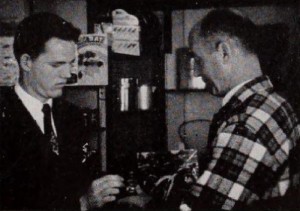
"May Day Conflict is a well executed and skillfully edited family story film of the conflict created by the opening of the trout season and a flower festival both falling on May first. The central character is a good loser (the husband, of course!), as he accompanies his wife to the flower show after elaborate preparations for his fishing trip. Herbert F. Sturdy has deftly woven into the story pattern light, humorous incidents to provide amusing comedy relief from his fine floral closeup studies. Expert camera handling and smooth transitions lend a semi-professional finish to the picture." Movie Makers, Dec. 1948, 493-494.
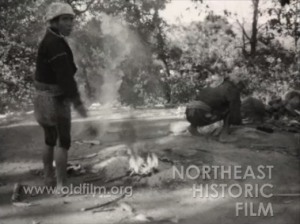
The film depicts Mayan rites in 1930's Guatemala along with intertitles describing the destruction of Mayan temples by conquerers and the performance of traditional ceremonies at the steps of churches.
"A family film with intertitles made for the Amateur Cinema League. The film follows the adventures of Herbert Miller, Jr., with his parents, his dog Chips, and his toys, including a pedal car and a teddy bear. Other segments show a ski trip to Mount Hood and a Miller's Paint store." Archives West.
Total Pages: 299